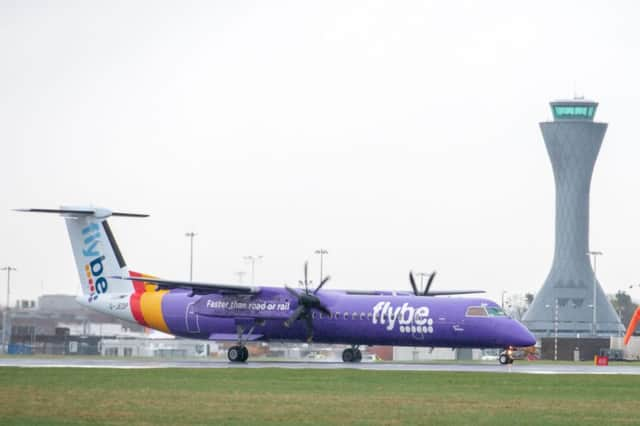This is what passengers nicknamed Flybe, and it wasn’t without reason - Alastair Dalton


Flybe is not what the troubled airline is called by many of its regular passengers. Flymaybe is the damning nickname commonly used to describe the carrier which some appear to take only because they have no choice.
But punctuality and reliability isn’t the only major gripe that came up in a straw poll I conducted on social media in the wake of this week’s turbulence over its future.
Advertisement
Hide AdAdvertisement
Hide AdRespondents told me of their particular upset over Flybe’s apparently inflexible policies over luggage, with travellers being stung £20 or more for hand baggage inches too big. It may not surprise you to hear the airline introduced checked-in luggage fees even before Ryanair.
My own experiences of flying with the airline have been mixed. I once spotted wording on a menu card that said passengers could not eat their own food on board. On my last flight, just over a year ago, you could not even check in on the Flybe app, and the plane was only half full, in stark contrast to the airline’s rivals.
But to give Flybe its due, opinion among the 34 people who responded to my poll was relatively evenly split, with 19 having poor experiences with the airline and 15 good ones.
Regardless of its performance, I thought Flybe’s future was secure after a consortium including Virgin Atlantic took over the struggling airline last year, which is to be rebranded as Virgin Connect.
‘Ambitious transformation’
A Virgin Atlantic roadshow came to Glasgow in November, boldly proclaiming Virgin’s ambition to become the UK’s second flag carrier after British Airways, fuelled by its new offshoot flying in passengers from across the UK to an expanded Heathrow.
Virgin Connect’s website talks about the airline embarking on an “ambitious transformation” which will “reflect the innovation and entrepreneurship of Virgin’s wider brands, putting our customers first and offering better value.”
Having heard all this, I was stunned to hear this week Flybe was on the brink. The UK Government said it is looking to help Flybe because it remains viable, unlike the collapsed Thomas Cook. But Virgin must have known what it was taking on, so rivals are rightly calling foul.
It’s worth remembering that Virgin has a previous record over operating UK flights, which must reinforce doubts about its long-term commitment to the sector.
Advertisement
Hide AdAdvertisement
Hide AdIt launched Little Red in 2013 to take on BA on Edinburgh, Aberdeen and Manchester to Heathrow routes, but that only lasted two years. Before and after the escapade, Virgin implored cross-Border travellers to take its trains instead of flying. Now that it no longer runs trains, for Virgin, flying is clearly the only way to travel - or so we thought, up to this week.
But back to Flybe. Arguably it might never have grown so big - or got into such difficulties - had BA not sold its non-London network of 52 loss-making UK routes to the airline in 2006. Willie Walsh, the then BA chief executive, said these would be “better undertaken by a regional low-cost airline”.
That marked a significant expansion for Flybe, which had grown from its roots as niche airline Jersey - then British - European, masterminded by Scot Jim French, who stood down in 2013. But it’s had a few mis-steps along the way, such as an ill-judged and unsuccessful attempt to take on Loganair on island routes after their franchise agreement bust up three years ago.
The jury is out on whether the owners can do any better.